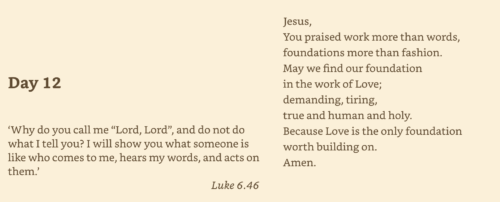Truth and Reconciliation
Richard Rohr teaches that restorative justice is not about denying harm, but about speaking truth in the service of forgiveness:
Almost all religions and cultures that I know of have believed in one way or another that sin and evil are to be punished and retribution is to be demanded of the sinner in this world—and usually the next world, too. Such retributive justice is a dualistic system of reward and punishment, good folks and bad folks, and makes perfect sense to the ego. I call it the economy of merit or “meritocracy.” This system seems to be the best that prisons, courtrooms, wars, and even most of the church (which should know better) appear equipped to do.
Jesus, many mystics, and other wisdom traditions—such as the Twelve Steps of Alcoholics Anonymous—show that sin and failure are, in fact, an opportunity for the transformation and enlightenment of the offender.
Mere counting and ledger-keeping are not the way of the Gospel. Our best self wants to restore relationships, and not blame or punish. This is the “economy of grace.” (The trouble is that we defined God as “punisher-in-chief” instead of Healer, Forgiver, and Reconciler and so the retribution model was legitimized all the way down!)
What humanity really needs is an honest exposure of the truth and accountability for what has happened. Only then can human beings move ahead with dignity. Hurt needs to be spoken and heard. It does not just go away on its own. This can then lead to “restorative justice,” which is what the prophets invariably promise to the people of Israel (see Ezekiel 16:53; Isaiah 57:17–19) and is exemplified in Jesus’ story of the Prodigal Son (Luke 15:11–32) and throughout his healing ministry. We lose that and we lose the Gospel itself.
As any good therapist knows, we cannot heal what we do not acknowledge. What we do not consciously acknowledge will remain in control from within, festering and destroying us and those around us. In the Gospel of Thomas, Jesus teaches, “If you bring forth that which is within you, it will save you. If you do not bring it forth, it will destroy you.” [1]
Only mutual apology, healing, and forgiveness offer a sustainable future for humanity. Otherwise, we are controlled by the past, individually and corporately. We all need to apologize and we all need to forgive or this human project will surely self-destruct. No wonder almost two-thirds of Jesus’ teaching is directly or indirectly about forgiveness. Otherwise, history devolves into taking sides, bitterness, holding grudges, and the violence that inevitably follows. As others have said, “Forgiveness is to let go of our hope for a different past.” Reality is what it is, and such acceptance leads to great freedom, as long as there is also both accountability and healing forgiveness.
